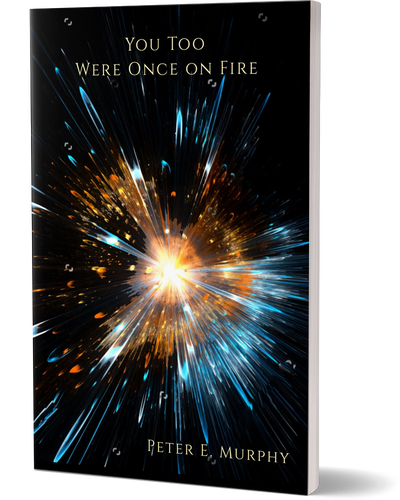2025 | Terrapin Books
You Too Were Once on Fire
The poems in You Too Were Once on Fire question the stars, the universe, the Divine and the human in an effort to understand joy, happiness. . . and cruelty, and the effect it has on the spirit.
Grounded in the physical world by a series of double sonnets about such phenomena as light, dust, clouds, tides, stars. . . and bananas, these poems reflect on the nature of creation, the expanding universe and the pettiness of our kind who profess answers rather than questions.
Order now from
Video interpretation of poem, “The Diaspora of Light,” created by Michael DiGiorgio of RedJacketFilms
Praise for You Too Were Once on Fire
“Murphy is clearly still immersed in flames and invites us to share in the warmth, and the burn.”
Grisel Y. Acosta, Wild
“Grief and relief / rhyme,” says one poem, and if there’s grief aplenty here, there’s a hundred times as much grace, as much elegance, as much unflagging splendor.”
David Kirby, The Winter Dance Party: Poems, 1983–2023
“These poems made me feel blessed to have read them and have a very real chance of being passed down from generation to generation.”
Joel Dias-Porter, Ideas of Improvisation
Excerpt
The Diaspora of Light
When he saw it shooting from the eyes
of his students, Plato realized that, like imagination,
light must be restrained. So he tried to chain
it in a cave like the wild thing it is
and invented stories to explain the folly
of perception. This light has traveled far
to ignite us. And because it is always moving,
it cannot be held…or saved.
You might say its greatest strength
is that it knows it is dying. And when it does,
it breaks into a million colors.
Does it sadden you to learn that goldfish
see more of these colors than you do? Bees,
birds, lizards…they too see what you cannot see.
When we were one-celled and luminescent
in the pond that spawned us, there was no space
in our peculiar jelly for doubt to metastasize.
Why then, knowing our brilliance would fade,
did we abandon that world to walk upright?
Our folly is that we believed we would be happy
in exile, far from a homeland
to which we will never return.
Is it a strength for you? Or a weakness,
knowing that you will die? Is this why,
when light ebbs during the cooler months,
you find it difficult to lift your body
from your bed, and you cannot stem the tide
of water leaking from your eyes?
From You Too Were Once on Fire
